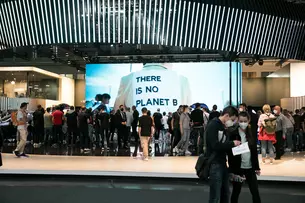Sustainability at Messe München
Anchoring responsibility with strategies
Sustainable management and projects for environmental and climate protection are strategic topics for Messe München. They were anchored in 2020 in its sustainability strategy, which is holistic in nature and is oriented toward the UN Sustainable Development Goals (SDGs). The strategy encompasses a variety of measures and projects focusing on energy, water, mobility, biodiversity, social issues, governance and resources. Important goals include making sustainability measurable, a zero-waste strategy to avoid waste and close resource cycles, setting up CO2 compensation opportunities for customers, and creating internal and external mobility offers that are as low in carbon emissions as possible.
This sustainability strategy was also the basis for anchoring the “Green Footprint” as a central pillar of the new 2026 corporate strategy. It has the primary goal of achieving carbon neutrality at Messe München by 2030—20 years earlier than foreseen by the Paris Agreement.
We are flanking our sustainability strategy with concrete measures and projects.
For us as a trade fair company, the topic of sustainability is also one of the greatest challenges of our time. International Environment Day is therefore a good occasion to highlight our current goals and measures with which we want to achieve CO₂ neutrality step by step by 2030. We are particularly proud of the thematic focal points that are actively placed on the topic of sustainability both at our own events and at our guest events. In this way, Messe München contributes to advancing the topic of sustainability in the respective sectors and to providing decisive impulses,
Measures for sustainable operation of Messe München
Messe München has a catalog of measures that details how it can meet its claim of sustainability structurally and logistically. In addition to the photovoltaic systems, halls C5 and C6 are heated entirely through district heating that is powered by geothermal energy. Open spaces that even include some of the roofs of our halls have been left as organic spaces in their natural states.
A combined heat and power plant powered by natural gas supplies the ICM—International Congress Center Messe München, the West Entrance and the Trade Fair Building with thermal energy and delivers electricity for the exhibition grounds. At the beginning of 2020, Messe München converted entirely to regeneratively produced electrical power and thus took a further step toward becoming a climate-neutral venue. Even during the years prior to 2020, more than half the electricity requirement was met using renewable energy sources, and the complete conversion to green electricity will now enable annual savings of around 6,400 tons of carbon emissions in normal operation. Our new halls C5 and C6 and the Conference Center North Messe München will be heated exclusively via district heating that is powered by geothermal energy.

A clever system for rainwater drainage at the venue helps us relieve the burden on the sewer system. The lakes on the grounds are fed with rainwater from rooftops that we collect in our own rainwater storage.
The photovoltaic system on the roofs of our trade fair halls supports electric supply on the grounds and is among the world’s largest photovoltaic roof systems. This energy from the sun enables us to avoid about 1,600 tons of carbon emissions every year that would be produced if we used fossil fuels to generate electricity at our events.
220,000 square meters of green space, around 2,500 trees, halls with planted exterior walls and 35,000 square meters of green roof—our exhibition grounds are literally green.
World Environment Day 2023: Messe München's current goals & measures
Doris Wagner, Director Public Policy & ESG, Lena Haushofer, Exhibition Director ISPO, Philipp Eisenmann, Exhibition Director IFAT and Matthias Strauss, Exhibition Director BAU take the World Environment Day as an opportunity to present the current goals and the resulting measures as well as the relevance of the topic of sustainability in terms of content within the framework of their own events - let's start the film!
Climate change is the greatest challenge of our time—which is why sustainability has since become one of the key pillars of strategic general orientation. Messe München aims to achieve carbon neutrality by 2030. Messe München supports this goal with the new Public Policy & ESG department, which concentrates all sustainability topics. Messe München accepts its responsibility as a social player and takes society's requirements into account.
Promoting an industry-specific dialogue on sustainability
Messe München has numerous trade fairs in its portfolio which per se have a strong focus on sustainable topics. Thanks to their international presence, they contribute to the cross-industry exchange of information and knowledge worldwide. On our global platforms, we also address topics that are crucial for the sustainable development of countries—both economically and socially.
In order to promote joint solutions for a sustainable future, Messe München has also launched the bgreen leaders sustainability network together with CIRCULAZE, the impact initiative for the circular economy. "bgreen leaders" operates across industries and aims at offering companies, start-ups and investors a cross-industry platform for networking and collaboration in order to present their initiatives in the field of environmental sustainability and thus promote change.

Trade fairs with a focus on sustainability
IFAT

OutDoor by ISPO

EXPO REAL

IAA MOBILITY

Creating sustainable ideas and inspiration for the region
Messe München generates revenue, taxes and jobs, in Munich but also across Germany. That’s the result of a study carried out by the ifo Institute on the economic effects of Messe München’s activities. Our trade fair guests from all over the world guarantee high purchasing power and tax revenues.
How the German economy benefits from Messe München
- In an average trade fair year, Messe München induces revenue of €3.29 billion in Germany, €2.6 billion of that in Bavaria.
- In the process, it creates around 27,300 jobs, of which about 22,600 are in Bavaria.
- Thus ensures tax revenues of €646 million in Germany, €250 million of this in Bavaria.

Sustainable management
It is a matter of great importance to us to strengthen the region’s economy and increase the common good, to promote environmental and climate protection and pursue knowledge transfers across our sites around the world.
This attitude is encouraged by our shareholder structure: The primary owners of Messe München are the state of Bavaria and the Bavarian state capital of Munich, and the Chamber of Industry and Commerce of Munich and Upper Bavaria ensure that business is involved. In other words, the company is owned by the citizens, and in that capacity, it has a special responsibility.
